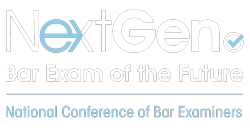
The Content Scope Committee (CSC) has been working diligently over the last few months on its charge to make recommendations to the Implementation Steering Committee (ISC) regarding the breadth and depth of content coverage for the next generation of the bar exam, which is no small feat. Put simply, the CSC will make recommendations about which knowledge and skills the new exam should test. The Testing Task Force determined the subject areas—the Foundational Concepts and Principles (FC&P)—as well as the practical skills and abilities—the Foundational Skills (FS)—that will be assessed based on the results of our practice analysis. But those high-level decisions were just the beginning, and currently our CSC members are doing the hard work of defining the scope of the FC&P with more precision. For example, specifically which topics should be assessed in the subject of “Torts”? Should some topics require a greater depth of knowledge than others, and if so, which ones?
NCBE developed a process for the CSC to follow in determining which legal topics within the FC&P subjects to include for assessment in the new examination and at what level of knowledge. Because the eight FC&P are subjects assessed in the MEE and MBE, we used the topics that are currently tested as a starting point for the CSC’s deliberations.
The process involves two steps of analysis:
Step 1. Should the topic be tested on the next generation of the bar exam?
For this step, the CSC is being asked to consider the frequency with which the topic arises in general entry-level practice, the “universality” of the topic (i.e., whether it is common to multiple entry-level practice areas), and the risk of serious consequences to the client if a newly licensed lawyer has no knowledge of the topic when it arises.
Step 2. If a topic should be tested, at what depth? In other words, what level of knowledge do entry-level lawyers need to practice competently?
For this step, the CSC is being asked to consider the level of detail at which a newly licensed lawyer who encounters the topic should be expected to know the doctrine without referring to legal resources. Factors discussed at this step of the analysis include the complexity of the topic and the context in which it typically arises in practice, both of which can affect how much time newly licensed lawyers have to respond and how likely they would be to consult a more experienced lawyer.
Steps 1 and 2 above result in the topics being sorted into three categories:
-
-
-
-
- Level 0: topics that newly licensed lawyers should not be expected to know and that do not need to be assessed on the new exam
- Level 1: topics with which newly licensed lawyers should be expected to have only broad familiarity, such that they are able to effectively spot issues and work efficiently with legal resources
- Level 2: topics for which newly licensed lawyers should be expected to know the relevant details of the applicable doctrine without consulting legal resources
-
-
-
To accomplish its work, the CSC split into subcommittees for the eight FC&P subject areas; each is preparing a detailed report for deliberation by the full committee. Those reports will identify the topics the subcommittee suggests should not be tested on the new exam, as well as topics that should be added to the new exam that are not assessed in the current bar exam. For all topics that will be tested, the subcommittee will provide recommendations regarding which aspects of those topics should be assessed and at what knowledge level (i.e., Level 1 or Level 2). They will also include notes regarding the most important sources of law (e.g., UCC sections, Restatement sections, model codes, seminal cases reflecting majority common law approaches), as well as notes regarding any topic for which the controlling authority or source of law is unclear or the sources are conflicting.
This focused effort will produce detailed guidance for the CSC on the breadth and depth of knowledge to be tested within each FC&P. Then the CSC will turn its attention to defining the FS to be tested on the next generation of the bar exam before it makes final recommendations to the ISC at the end of this year. Once the scope of content is defined and shared for public comment, additional work will need to be done to organize the content into the test specifications or blueprint in a way that effectively conveys to candidates what they should be prepared to know and be able to do when they take the new exam.


